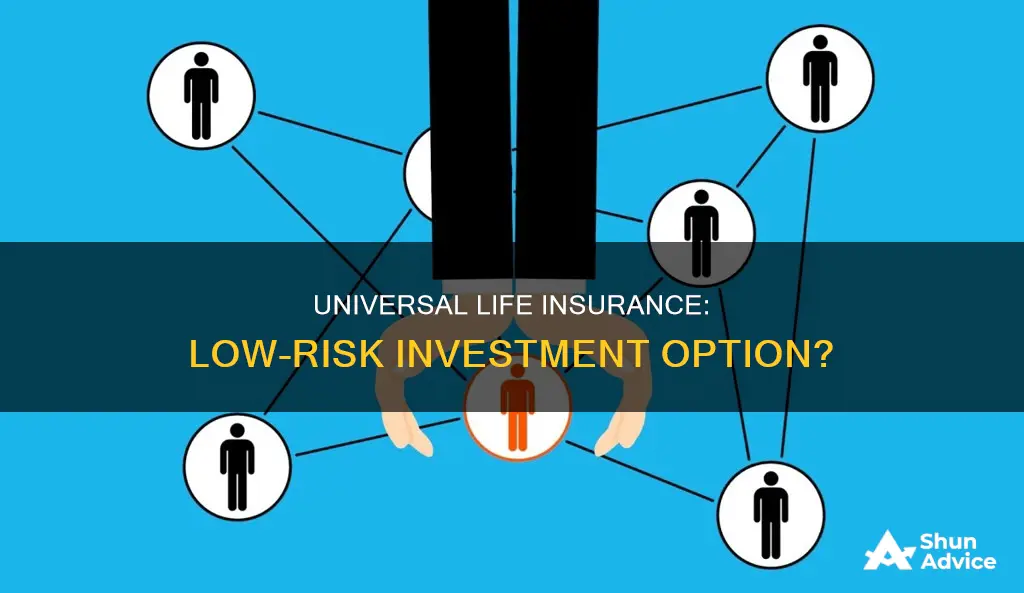
Universal life insurance is a type of permanent life insurance that offers flexible premium payments and lifelong coverage. It is also an investment savings product, with the ability to accumulate cash value over time. However, universal life insurance is not without its risks. Policyholders need to monitor their policies to ensure they remain adequately funded, and there is a risk that cash value growth may not meet expectations, particularly if interest rates drop. So, is universal life insurance a low-risk investment? The answer depends on several factors, including the policyholder's financial situation, the insurance company's performance, and the specific features of the policy.
| Characteristics | Values |
|---|---|
| Type | Permanent life insurance |
| Coverage | Lifelong |
| Cash value | Yes |
| Premium payments | Flexible |
| Death benefit | Flexible |
| Risk | Medium |
What You'll Learn
- Universal life insurance offers flexibility with premium payments and death benefits
- It's a permanent form of life insurance that can last your entire life
- It can be a low-risk investment due to the guaranteed minimum interest rate
- The cash value of the policy can be used to take out loans
- It may be a better option than whole life insurance if you want adjustable coverage

Universal life insurance offers flexibility with premium payments and death benefits
Universal life insurance is a type of permanent life insurance that offers flexible premium payments and death benefits. It allows the policyholder to raise or lower their premiums within certain limits, providing flexibility to accommodate variable earnings. This flexibility also extends to death benefits, which can be increased or decreased within certain guidelines.
The ability to adjust premium payments is a significant advantage of universal life insurance. Policyholders can choose to pay more than the minimum required premium, which helps build the cash value of the policy. This cash value grows over time, earning interest based on the current market rate or the policy's minimum interest rate, whichever is higher. The cash value can be accessed through withdrawals or loans, providing a source of funds for other purposes. However, it is important to monitor the cash value to ensure that it does not drop too low, as this could result in higher premium payments or even policy lapse.
Universal life insurance also offers the flexibility to adjust death benefits. The coverage can be increased over time to meet changing needs, such as purchasing a larger home or having another child. Additionally, the death benefit can be decreased if financial responsibilities change. This flexibility allows policyholders to customise their coverage according to their specific circumstances.
Universal life insurance provides a combination of flexible premiums, access to cash value, and the possibility of flexible, lifelong coverage. It empowers individuals to respond to opportunities or disruptions in their financial situation without restructuring their life insurance policy. The flexibility of universal life insurance makes it a popular choice, especially for high-net-worth individuals who seek to provide financial security for their families and protect their assets.
Insurance in India: An Investment or a Safety Net?
You may want to see also

It's a permanent form of life insurance that can last your entire life
Universal life insurance is a permanent form of life insurance that can last your entire life. It is a type of permanent life insurance that offers the ability to adjust your premium payment amounts (within certain parameters). It is also known as adjustable life insurance.
Universal life insurance policies have a cash value component, which means that they can accumulate cash value over time. This cash value can be accessed through withdrawals or policy loans. The cash value earns an interest rate set by the insurer, which can change frequently, although there is usually a minimum rate that the policy can earn.
One of the main benefits of universal life insurance is its flexibility. It allows you to adjust your premium payments and death benefit amounts within certain limits. This can be useful if your cash flow is variable or if your need for life insurance decreases over time.
Another advantage of universal life insurance is its potential for cash value growth. The cash value can grow over time, and you may be able to access this cash value through withdrawals or loans. However, it's important to note that policy loans and withdrawals will deplete your cash value and could cause your policy to lapse if you don't make extra premium payments.
Universal life insurance also offers lifelong coverage as long as you pay your premiums. It is important to note that if you underpay for too long, it could affect your death benefit or cause your policy to lapse.
Overall, universal life insurance can be a good option for those who want permanent coverage and the flexibility to adjust their premium payments and death benefit. However, it is important to carefully consider the potential risks and complexities of this type of insurance before purchasing a policy.
Foreign Currency Investment in India: A Guide
You may want to see also

It can be a low-risk investment due to the guaranteed minimum interest rate
Universal life insurance is a type of permanent life insurance that offers flexible premium payments and death benefits. It is considered a low-risk investment due to the guaranteed minimum interest rate offered by insurance companies. This means that even if market conditions are unfavourable, policyholders can still earn interest on their cash value, making it a safer option than variable life insurance.
The cash value in a universal life insurance policy earns interest based on the current market rate or the policy's minimum interest rate, whichever is greater. This minimum interest rate is usually guaranteed, protecting policyholders from significant losses if interest rates drop. While the cash value may not grow as much as hoped during periods of low-interest rates, it is still likely to earn some interest, making it a more stable option than other investments that may lose value.
Additionally, universal life insurance policies offer the ability to adjust premium payments. If policyholders are experiencing financial difficulties, they can choose to pay less than the minimum premium, as long as they have sufficient cash value to cover the cost of insurance and other expenses. This flexibility can help ensure that the policy remains active, even during challenging economic times.
The guaranteed minimum interest rate and the ability to adjust premium payments make universal life insurance a relatively low-risk investment option. However, it is important to note that there are still risks associated with this type of investment, and policyholders should carefully monitor their cash value and premium payments to avoid potential lapses in coverage.
Savings Transform to Investment: When and How?
You may want to see also

The cash value of the policy can be used to take out loans
Universal life insurance is a type of permanent life insurance that offers lifetime coverage as long as the policyholder pays their premiums. It has a cash value element that can be used to take out loans. This cash value accumulates over time, and the policyholder can borrow against it. The loan can be used for various purposes, such as covering unexpected medical expenses, funding education, supplementing retirement income, or investing in real estate or business opportunities.
Taking out a loan against the cash value of a universal life insurance policy has several advantages. Firstly, it does not require a credit check, which means that the policyholder's credit score is not affected. Secondly, the interest rates on these loans are often lower than those of traditional bank loans. Thirdly, the repayment terms are flexible, and the policyholder can choose to repay the loan on their own schedule. Fourthly, the loan process is usually quick, providing fast access to funds when needed. Finally, the loan is kept private between the policyholder and the insurance company.
However, it is important to note that unpaid loans will reduce the death benefit by the outstanding amount. Additionally, if the policy terminates or lapses before the loan is repaid, there may be tax liabilities on the unpaid balance. Therefore, it is advisable to consult a trusted financial advisor or licensed insurance agent to understand the potential impact on the death benefit and any tax consequences.
Building an Investment Portfolio: A Comprehensive Guide
You may want to see also

It may be a better option than whole life insurance if you want adjustable coverage
Universal life insurance is a type of permanent life insurance that offers the ability to adjust your premium payment amounts (within certain parameters). It is also known as adjustable life insurance. This is a valuable feature if your cash flow is variable. You can also adjust your death benefit amount. That means you can lower your death benefit if your need for life insurance decreases over time. Or you may be able to increase your death benefit amount, but you will likely have to go through further underwriting to get an increase.
Universal life insurance can be in force for the rest of your life (assuming you make the premium payments). It typically offers a cash value component. You can take money out of cash value via a withdrawal or policy loan. If you surrender a universal life insurance policy, that ends the coverage and you will receive the cash value, minus any surrender charge.
Compared to whole life insurance, universal life insurance can be cheaper because it doesn't offer the same guarantees. Whole life insurance is generally the most expensive way to buy life insurance because of the guarantees within the policy. Whole life insurance has set premium payments.
Universal life insurance may be a better option than whole life insurance if you want adjustable coverage. Whole life insurance has fixed premiums over the life of the policy, whereas universal life insurance offers flexible premiums. You can increase or decrease the amount you spend on premiums with universal life insurance.
However, it is important to note that universal life insurance requires a more hands-on approach than whole life insurance. The cash value of a universal life insurance policy needs to be monitored to ensure that it does not become underfunded, which could lead to large payment requirements to maintain coverage. Additionally, the interest rate on a universal life insurance policy is not guaranteed and can change frequently, whereas whole life insurance offers a guaranteed rate of return.
Breaking Up with Your Investment Manager: A Guide
You may want to see also
Frequently asked questions
Universal life insurance is a type of permanent life insurance that offers flexible premium payments and death benefits. It also has a cash value component that can be invested to generate returns.
Universal life insurance offers several benefits, including flexible premium payments, the ability to adjust the death benefit, potential cash value growth, and tax advantages. It also provides permanent coverage for as long as the premiums are paid.
There are some risks associated with universal life insurance. The cash value can decrease if the investments underperform, and the policy may lapse if there is not enough cash value to cover the cost of insurance. Additionally, returns are not guaranteed, and some withdrawals may be taxed.
Universal life insurance offers more flexibility than whole life insurance, as it allows for adjustable premium payments and death benefits. It also has the potential for higher returns compared to whole life insurance. However, whole life insurance offers more stability with fixed premiums, death benefits, and guaranteed cash value growth.







